- Home
- Richard Adams
The Plague Dogs Page 11
The Plague Dogs Read online
Page 11
"Was there ever a dog that could fly?"
"Yes," replied Rowf promptly, "but the whitecoats cut off its wings to see what would happen."
"What did happen?"
"It couldn't fly."
"Then it's no worse off than we are. I'll go as slowly as you like."
Rowf stumbled stiffly forward and the pair set off towards the stream. In the windless warmth of the St. Martin's summer afternoon, Snitter's spirits began to rise and he pattered about the moss, splashing in and out of shallow pools and jumping in pursuit like a puppy whenever he put up a wheatear or whinchat in the bog.
They had no need to search for the carcase they had left. Even before they winded it they could hear the raucous squabbling of two buzzards, and a few moments later saw them hopping and fluttering about their ripwork. As the dogs approached, the big birds turned and stared at them angrily, but thought better of it and flapped slowly away, sailing down on brown wings towards the tarn.
"It's little enough they've left," said Rowf, thrusting his muzzle into the fly-buzzing, blood-glazed remains. Snitter hung back, looking about him.
"It's not only them. There's been some other creature--"
Rowf looked up sharply. "You're right. I can smell it. But what? The smell--makes me angry, somehow--"
He ran about the rocks. "I'll catch it. The smell--like a horse-mouse. What d'you make of it?" He was slavering as he spoke.
"Never mind," answered Snitter, pressing down with one paw upon the haunch he was tearing. "It's not here now."
"Yes, it is. Watching, I think. Lurking. Not far off."
"Let's not leave anything here if we can help it," said Snitter. "Eat all you can and we'll carry the rest back to the rhododendrons--a good chunk each, anyway."
They returned to the cave in the late afternoon, Snitter with a fore-leg, Rowf half-dragging the rank-smelling remains of the haunch. For some time they lay in the sun on the flat turf outside, retreating to the shaft only when the light was half-gone and a chilly breeze came rippling up the tarn from the west. Snitter scrabbled out a shallow recess in the shale to fit his body, lay down in it with a comfortable feeling of hunger satisfied and fell quickly asleep.
He woke suddenly, in pitch darkness, to realize that Rowf was creeping warily across the tunnel a few yards away. He was about to ask him what he was doing when something in Rowf's movement and breathing made him hold himself motionless, tensed and waiting. A moment later he became aware of the same strange reek that they had scented near the sheep's carcase. He lay still as a spider, letting the smell flow through him, seeking from it all that it could tell. It was not an angry smell, nor a dangerous smell: but none the less wild, yes and exciting, a sharp, killing smell, a furtive smell, trotting, preying, slinking through the darkness. And it was a quick-moving smell. Whatever the animal might be, it was on the move, it was alive here, now, in the cave with them. This, of course, was the reason for Rowf's caution and crafty alertness, which Snitter had already sensed in the moment of his own waking.
Why had the animal come? To kill them for food? No, this, he knew instinctively, it had not. Whatever it might be up to, it was trying to avoid them, although it smelt like an animal which could fight if it were forced to. Because this was its home? But its smell was very strong and distinctive, and there had been no trace of it here yesterday. Then it could have come only in order to try to steal their meat.
At this moment there was a sudden, momentary clattering of loose stones in the dark and immediately Rowf said, "Stay where you are. If you try to get past me I'll kill you."
There was no reply. Snitter, feeling himself trembling, got up and took a position a few feet away from Rowf, so that between them the way out was effectively blocked.
"I'll kill you, too," he said, "and that'd be twice, so it wouldn't be worth it."
The next instant he jumped back with a sharp yap of astonishment, for the voice answering him was speaking, unmistakably, a sort--a very odd sort--of dog language. Barely understandable and like nothing he had ever heard, the voice, nevertheless, was undoubtedly that of an animal in some way akin to themselves.
"It'll de ye smaall gud killin' me, hinny. Ye'll not see three morns yersel'."
There was a kind of wheedling defiance in the voice, as though the owner had not yet decided whether to fight, to run or to cajole, but was trying the latter and putting an edge to it for good value.
"Who are you?" said Rowf. Snitter could sense his uncertainty, and wondered whether the animal could also do so. "Are you a dog?"
"Why ay, Ah'm a derg. Watch ahint ye!" cried the voice in a sudden tone of urgent warning. Snitter leapt round. In the moment that he realized he had been tricked, Rowf blundered against him, dashing across the breadth of the tunnel to prevent the intruder's escape. Both were biting now and snapping, but as Snitter, picking himself up, jumped to Rowf's help, the scuffle broke off, the shale clicking once more as the animal ran back into the tunnel.
"Stay where you are!" said Rowf again. "If you run any further I'll follow you and break your back!"
"Howway noo, kidda," replied the animal, in the same strange dog-jargon. "Ne need fer ye an' me te start battlin'. Laa-laa-let, ma bonny pet."
Listening, Snitter felt his blood tingle, not with fear but with a kind of thrilled repulsion and attraction. The voice of the smell was obsequious, cunning, that of a thief, a liar, masterless, callous and untrustworthy. It was also full of sardonic humour, of courage and resource, and pitiless, most of all for itself. Its lilting rogue's jargon spoke to his own madness. Fascinated, he waited to hear it speak again.
"By three morns, the pair on yez'll bowth be deed. Forst ye bleed an' then yer deed," said the voice, in a kind of crooning spell. "Lie an' bleed, ye'll bowth be deed, crows hes been an' picked yer een."
Snitter found himself answering spontaneously, without thought.
"The sky opened, you know," said Snitter. "There was a thunderstorm and this lightning shot down into my head. Before that, it was black and white; I mean, the road was black and white; and then the lorry came and the tobacco man set my head on fire. I can bark and I can jump and I can catch a sugar lump." He threw back his head and barked.
"Shut up," said Rowf.
"De ye say so?" said the voice to Snitter. "Whey, mebbies. Howway wi' me, lad, tappy-lappy, aall tegither, an' Ah'll put yez on the reet road. Mind, thoo beats them aall fer a bonny mate, Ah warr'nd."
"Yes," said Snitter, "you understand a lot, don't you? I'll go along with you; you show me where." He began moving forward in the dark, towards the voice.
"By, mind, ye've been fair bashed, hinny," whispered the voice, close to him now. "Who gi' ye that slit o' th' heed? Who dun yon? Yer sore hunt!"
"It was the whitecoats," answered Snitter.
The reek was all round him now, the pain in his head was gone and he and the voice were floating elegantly, effortlessly, towards the dark-blue, star-twinkling oval of the cave-mouth.
He did not realize that Rowf had knocked him down until he heard the strange animal once more run back down the tunnel. Then he smelt that Rowf was so angry that if he did not take care he was likely to be badly bitten. Lying quite still, he said, "Rowf, there's no point in killing him, whatever sort of animal he is. He'd fight and it'd be too much trouble."
"You didn't wake up soon enough," answered Rowf. "If I hadn't stopped him he'd have been off with that leg-bone you brought back."
"He says he's a dog. If your shadow could sing--"
"I don't care what he says he is, he's a thief. I'll make him sorry."
"Noo give ower," said the creature in the dark. "Go canny. Let's aall be pals, ne need fer brawlin'. Stick wi' me and we'll aall be champion. Else ye'll be deed soon, like Ah towld yez."
"Dead?" said Snitter.
"Ay, deed, an' ne argument a boot it, ne bother."
"Why should we be?"
"Whey, hinny, ne chance at aall, gannin' aboot th' fell killin' yows an' hollerin' yer heeds of
f," said the creature. "Ye gan on that style and ye'll have me kilt forbye. Ye should be neether seen nor hord, else yer deed dergs, Ah'm tellin' ye."
"What are you telling us, then?" asked Snitter, "his fascination growing as he realized that, unlike Rowf, he could partly understand the creature's talk.
"Ye'll hunt an' ye'll kill weel, wi' me. Ye'll gan oot an' come back fed, wi' me. Ye'll run through th' neet an' foller me feet an' Ah'll keep ye reet. Ah'll keep ye reet, ye'll get yer meat." The voice had taken on a rhythmic, hypnotic cadence, wheedling and sly, that made Snitter prick his ears and dilate his nostrils to the smell in the dark.
"Listen, Rowf, listen!"
"Whatever he is, he's not to be trusted," answered Rowf. "Anyway, I can't understand a word he says."
"I can," said Snitter. "I'll smell and I'll tell. I've listened to birds in the chimney and beetles under the door. My head feels better. It's open like a flower." He cut a caper on the shale.
Rowf growled and Snitter collected himself.
"He says we're strangers here and we're in danger because we don't know the place or how to look after ourselves, and for some reason that puts him in danger too. He's suggesting that we let him share what we kill and in return he'll give us advice and tell us what to do."
Rowf considered. "He'll only cheat us, and run away when it suits him. I tell you, he's not to be trusted."
"We've nothing to lose. He's a sharp one, Rowf--bright as the leaves on the trees." Snitter now felt that he would give anything to see the owner of the voice, or merely to keep him with them a little longer. The dreary cavern seemed crackling with his shifty vitality.
"Grab hold of your meat and lie on it," said Rowf. "I'm going to do the same. If you're still here when it's light," he said into the darkness, "we'll see what you are and whether you're worth feeding. What do you call yourself?"
The answer, taunting, mordant and inscrutable, came in a whisper from some further recess of the tunnel.
"Dry an' warrm's nivver harrm. Keep tight hold o' yer meat an' gud luck gan wi' ye. Noo yer taalkin' sense. Who am Ah? Ah'm tod, whey Ah'm tod, ye knaw. Canniest riever on moss and moor!"
Monday the 18th October
"--so after we'd got out," said Rowf, "we didn't know where to go. We came to some houses, but I bit a man who was going to put Snitter in a car--he saw him lying by the road and picked him up--so we ran away. Then, later, a man with a lorry threw a stone at Snitter--"
"There was another man who was hunting sheep with his dogs," put in Snitter. "We went to help them, but the dogs drove us away."
The tod, lying on the shale at several yards' safe distance, head on sandy paws, listened intently as it continued gnawing on the remains of the fore-leg. Outside, the cloudy, grey light of morning showed a drizzling rain drifting across the mouth of the cavern.
"Snitter thought we ought to go on trying to find some man or other who'd take us to his house and look after us," said Rowf, "but I couldn't see the sense of that. To begin with, the men have taken away all the houses and streets and things--Snitter admits it himself--but apart from that, it's a silly thing to expect. Men are there to hurt animals, not to look after them."
"Noo yer reet, hinny. Guns an' dergs, an' trraps an' aall. Ye'd be a fond fyeul an' loose i' th' heed te seek oot th' likes o' them." The tod cracked a small bone and spat it out. "Crrunshin' bait's th' bonniest."
"I know where I ought to be," said Rowf. "Back with the whitecoats, like the other dogs. All right, I'm a deserter. I'd like to be a good dog, but I can't--I can't go near another tank."
"The whole place seems to be covered with these great tanks," said Snitter. "How often do the men put animals into them, and what sort of animals? They must be huge!"
The tod glanced shrewdly from one to the other, but answered nothing.
"You're a wild animal, aren't you?" said Rowf. "You never have anything to do with men?"
"Ay, noo an' agyen." The tod showed its teeth. "Ducks an' new lambs." It rolled on one side, licking briefly at a long, white scar on its belly. "An' kittens i' th' barn, wad ye think it, noo?"
"Kittens?" asked Snitter, astonished.
"Th' aald cat come, so Ah teuk off wi' th' one."
"Teuk off with the one?" Snitter was at a loss.
"Ay, just th' one."
"I mean to live here as a wild animal, that's the long and short of it," said Rowf. "Snitter can go and look for men if he wants to. I'm a mouse and this is my drain."
"Wivoot me, bonny lad, Ah'll gi' ye ne mair than three morns."
"Go on," said Snitter, "why not?"
"Ah've seen nowt dafter, th' pair on yez, lyin' flat oot o' th' fell like wee piggies full o' grub, like there wez neether dergs nor shepherd aboot. Ye fells th' yow, bolts it doon ye, kips ye doon a spell an' comes back like a pair o' squallin' cubs. Ye took ne heed at aall o' shepherd's gun or dergs. Ah'd think shame o' ye, ye pair o' daft nowts."
Rowf's hackles rose at the sardonic mockery in the sharp, thin voice, and at once its tone changed to one of open, honest admiration.
"By, mind--ye pulled yon yow doon clever, though. By, hinny, yer a hard 'un. There's none like ye. Hard as th' hobs ye are--a fair mazer!"
"It knocked me about," said Rowf. "I'm bruised all over."
"Hinny, there's ways. Wi' me ye'll sharp knaw hoo te duck an' dodge. There's ways o' gettin' stuck in hard, an' ways o' duckin' oot. Wi' me aside ye, a greet, hard boogger like ye'll hev ne bother. Ye'll sharp larn th' ways, an' a sharp tod like me's th' one te larn ye hoo."
"Do you kill sheep, then?" asked Snitter in surprise, thinking that the tod was, if anything, smaller than himself.
"Whey, mebbies a bit young lamb i' th' spring if th' chances come. But yon derg's a mazer for th' yows," replied the tod, keeping its eyes on Rowf with a look of great respect. "Come te that, ye cud bowth be dab hands."
"Do you want to stay here with us--is that what you're saying?" asked Snitter, once more feeling, as he had felt in the night, a mysterious and exciting affinity with this devious, insinuating creature, whose every word and movement seemed part of the spinning of some invisible net of stratagem.
"Ah, whey, ye'll hev ne bother wi' me. Ah do nowt but pick at me meat," said the tod. It got up, slunk quickly to the cavern's opening, peered round one corner into the falling rain and returned. "Us tods, we nivver stop runnin', nivver till th' Dark cums doon. An' yon's a bonny way off yit--th' Dark--for Ah warr'nd they'll hev te move sharp te catch me."
"And that's what you're offering--you share what we kill and in return you'll teach us how to survive here and help us not to be seen or caught by men?"
"Ay. Noo yer taalkin'. Otherwise th' Dark'll be doon on ye, ne time at aall. Yon farmer'll hev yer hides full o' lead an' it'll be off an' away into th' Dark wi' yez."
The tod rolled on its back, tossed the knuckle-bone into the air, caught it and threw it towards Snitter, whose clumsy, late-starting grab missed it by inches. Annoyed, Snitter jumped across to where the bone had fallen, picked it up and looked around for the tod.
"Ahint ye!" It had passed him like a shadow and was hovering light-footed on the shale at his back. "Hill bide ye, an' fern hide ye, an' stream drown yer scent aside ye!"
"What's your name?" asked Snitter, having, as he spoke, a curious illusion that the tod was hanging poised on the stones as the buzzards on the wind-currents above the fell.
For the first time the tod seemed at a loss.
"Your name?" repeated Snitter. "What do we call you?"
"Why, ye knaw, ye knaw," answered the tod, with the hesitant lack of conviction of one unwilling to admit that he does not understand a question. "Mind, yer aye a canny 'un. Reet pair o' dazzlers."
There was a pause.
"He hasn't got a name," said Rowf suddenly. "Neither had the mouse."
"But how can he--"
"Dangerous thing, a name. Someone might catch hold of you by it, mightn't they? He can't afford a name--that's my guess. He hasn't got one. He's a wil
d animal."
Suddenly a great flame of abandonment crackled up in the thorny tangle of Snitter's mind. He could be done with care. He too could become burdened with no name, no past, no future; with no regret, no memory, no loss; no fear but caution, no longing but appetite, no misery but bodily pain. No part of his self need be exposed except his awareness of the present and that gone in an instant, like a fly snapped at and missed on a summer afternoon. He saw himself, bold and wary, floating on life, needing nothing, obedient only to cunning and instinct, creeping through the bracken upon the quarry, vanishing from pursuers like a shadow, sleeping secure in hiding, gambling again and again until at last he lost; and then departing, with a shrug and a grin, to make way for some other trickster nameless as himself.
"Stay!" he cried, jumping on Rowf like a puppy. "Let him stay! Wild animals! Wild animals!"
Frolicking, he rolled over, scratching his back on the shale, and began clawing and worrying in earnest at the tattered dressing on his head.
"It seems most unfortunate," said Dr. Boycott, looking up at Mr. Powell over his spectacles. "And I'm afraid I still can't make out, from what you've told me, how it came to occur."
Mr. Powell shifted his feet uneasily. "Well, I certainly don't want to put the blame on Tyson," he answered. "He's a good bloke as a rule. But as far as I can make out, he didn't notice on Friday evening that there was a length of wire netting loose along the bottom of eight-one-five's pen, and some time that night eight-one-five must have worried its way through to seven-three-two's side." He stopped, as though to suggest that there was no more to be said. Dr. Boycott continued to look at him as though there were, and after a pause Mr. Powell continued.
"Well, then the spring of the catch of seven-three-two's door happened to break and that's how they both got out."
"But if the door had been shut properly, it would stay shut, wouldn't it, even if the spring of the catch did break? It wouldn't move of its own accord."

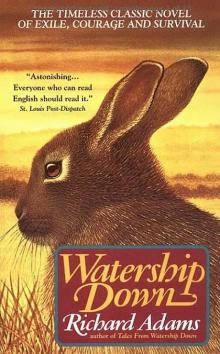 Watership Down
Watership Down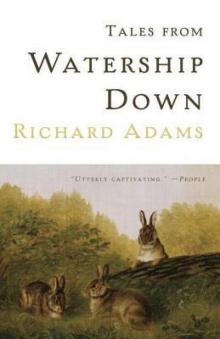 Tales From Watership Down
Tales From Watership Down Maia
Maia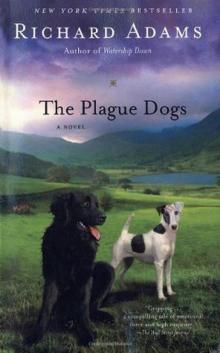 The Plague Dogs
The Plague Dogs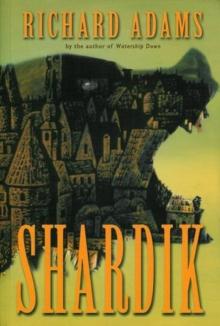 Shardik
Shardik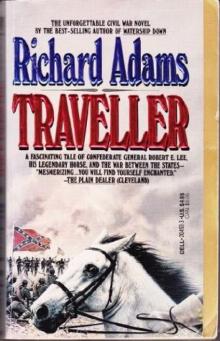 Traveller
Traveller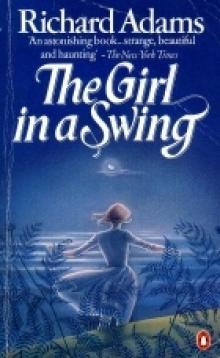 The Girl in a Swing
The Girl in a Swing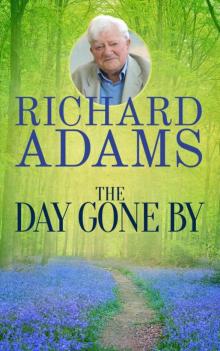 The Day Gone By
The Day Gone By Daniel
Daniel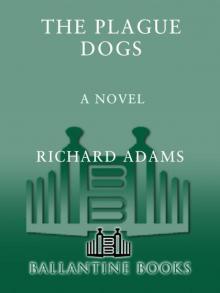 The Plague Dogs: A Novel
The Plague Dogs: A Novel